Thanks to support from institutional and individual donors, Transparency was able to continue tracking the most powerful people, as well as advocating for solutions and engaging people in public scrutiny in 2022.
At the end of January 2022, Transparency International published the latest results of the most cited corruption perception ranking to date, in which Slovakia improved and ranked 56th out of 180 countries, four positions better than the year before. This ranking still reflects the situation for 2021 and partly for 2020. However, we also experienced a turbulent period during 2022. So, what was it like from the perspective of Transparency Slovakia?
The biggest challenge for the past year was the monitoring of campaign financing in the combined municipal and regional elections which Transparency has been monitoring from July until the October elections. On a separate portal https://volby.transparency.sk, citizens could clearly track information from over 540 transparent accounts of candidates and parties with expenses of over 11.5 million euros.
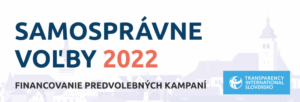
Transparency has published over 50 analyses and findings on problematic aspects of campaigns, and we have repeatedly assessed the transparency approach of around 100 of the largest campaigns. This gave citizens the opportunity to scrutinize candidates and their financing in regions and regional cities and to make better choices in the first combined provincial elections (municipal and regional elections).
In 2022, Transparency published two transparency rankings – of the eight regions and of the hundred largest cities in Slovakia for the sixth time.
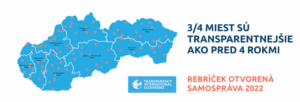
In both rankings – regions and cities – local governments have improved and achieved their highest average scores to date. This is positive news and shows an increasing openness and transparency towards residents. Since 2010, both rankings have long contributed to citizens being able to compare their local government with others and, in turn, have motivated local governments to behave more and more transparently.
At the level of local governments, fairness of reporting in local periodicals is also important. Particularly in the run-up of elections, this can have a significant impact on influencing the public, the fairness of electoral campaigns and the elections themselves.
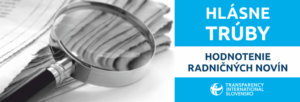
Transparency monitored and evaluated 420 editions of city hall newspapers from 84 local governments. Citizens can find the ratings on the specialized portal Trumpeters: https://hlasnetruby.transparency.sk, and this is the third evaluation of the objectivity and public character of city hall newspapers. Negatives still outweighed positives in up to a third of the titles.
This ranking also motivates local governments to continuously improve, to take fairer approach and thus, contribute to more objective information for citizens.
Thanks to the support of 298 donors, Transparency has expanded the Who Owns Slovakia portal (Kto vlastní Slovensko) aimed at promoting ethical shopping in tourism and included new hotels, ski resorts, water parks, spas, golf resorts and other attractions.

Users of the portal can look up information on the ownership background and reputation of the owners of nearly a thousand popular touristic accommodations. The map of hotel owners and other tourism accommodations provides the public with a better insight into the issues of transparency and where to invest their money more fairly. In this way, the portal provides an important basis for ethical consumer shopping.
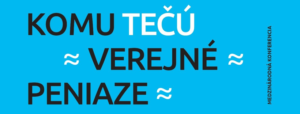
The international conference “Who is the public money flowing to” (“Komu tečú verejné peniaze”), also attended by top foreign experts, highlighted the need to identify the real owners of companies trading with the state, as well as the fight against shell companies and money laundering across Europe. She also discussed the necessary legislative improvements to owner registers.
Several important topics – such as shell companies or local media issues – were also discussed in roundtables. We organized two multi-day workshops for regional and local activists, discussions with the public or at universities, including a public discussion of the Whistleblower’s Journey.
Mapping state Corona subsidies and exposing problematic or fraudulent cases in a series of Transparency stories earned the Journalism Award for Citizen Journalism.
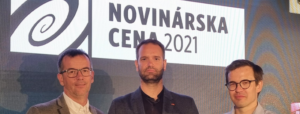
In the Brigádnici case, in which we drew attention to a dubious case of subsidies worth EUR 3.6 million, the NAKA launched a prosecution for subsidy fraud.
A prerequisite for more efficient work of the public administration is also fairer selection procedures which will bring the most capable candidates to the institutions. Our Transparency team members have been active in the Working Group on Increasing Transparency in Tender Procedures at the Government Office. We have participated in a number of tender commissions, and we have also highlighted problematic aspects, for example, when appointing the chairpersons to the Public Procurement Office or to the Antimonopoly Office of the Slovak Republic.
At Transparency, we also continued our international cooperation and projects, whether it was on the transparency of local governments in Kosovo, public participation in Iceland, the fight against shell companies in Norway, or election rules and local media issues in Visegrad countries.
Samuel Spáč, an analyst, university lecturer and his former colleague, has replaced Martin Šuster as chairman of the Transparency Board of Directors after Martin Šuster has become a member of the Council for Budget Responsibility. After a year and a half, we also welcomed back the former Director of Transparency International Slovensko (TIS), Gabriel Šípoš, who joined the TIS Board of Directors.
The year 2022 was indeed a turbulent one. It was finally confirmed by the December motion of no confidence in the government that primarily earned its legitimacy upon fight against the mafia and corruption. How well it has done in this area is aptly summed up by its result in the aforementioned global corruption perception ranking. Slovakia has managed to move up four places and it is undoubtedly a success but the government’s intention in the program statement to improve by up to 20 places has proved unrealistic. You can also read more about the assessment of the outgoing government performance in our summary.
Thank you for your support for better, corruption-free Slovakia.